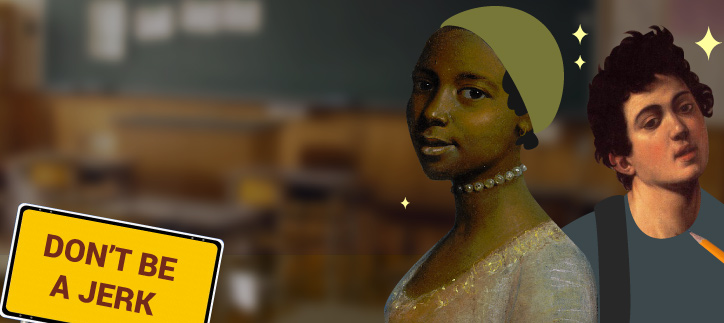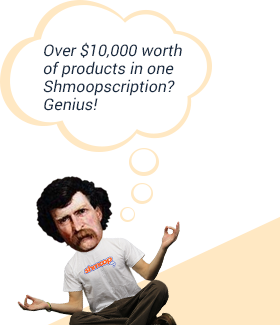
Teaching PBIS: Cooperation
Because they clearly missed the memo in Kindergarten.
Looking for more PBIS resources? Check out all of our Teacher Guides and Online Courses here.
There are two types of multiplayer games out there: co-op and competitive. Many of the most popular games combine the two, requiring players to work together as a team to defeat the other groups. Any sport is like this—football, baseball, League of Legends. The best skill to have in any of these competitions isn't accuracy or strength—it's teamwork. Let's work as a team to teach your students the best techniques for successful cooperation.
In this guide you will find
- an activity where students will build a Cooperation Playbook (silver linings optional, but encouraged).
- discussion questions to help students think about how their family can work together better.
- an assignment instructing students to make their own poetry from the poems of others.
There is no "I" in "smash your opponents to gooey chunks." That's something best done as a team. You, your students, and Shmoop will be an unbeatable one.
DAY 1: SO LET'S ROOT, ROOT, ROOT FOR THE HOME TEAM
Introduction
Today, students will work together in a hands-on, team-based activity that requires cooperation in order to succeed. Afterward, they'll create a mini-playbook that highlights their team's best strategies. For homework, students will apply their classroom team's strategies to their at-home "team" and draft a chore chart (and maybe even be inspired to give their parents a day off every now and then).
Before you get started, here's a video you can show to your class.
Key Skills and Learning Objectives
- Working together to achieve goals efficiently
- Being a valuable, accountable team member
- Thinking strategically to solve problems
- Developing confidence through group participation
Homework
- Yesterday: Think about what it means to cooperate.
- Today: Create a home Chore Chart.
THE COOPERATION CUP
Materials Needed: Plastic cups (three per student), copies of the handout
Estimated Time to Complete: 50 minutes, including wrap-up reflection activity
[Before beginning the activity, perhaps before students arrive, stack the cups in sets of three all over the classroom. Any flat, stable surface is fair game, from desks to bookshelves to the floor. The total number of sets should equal the total number of students in the class.]
You probably have several chores at home. If you have brothers or sisters, odds are they have chores, too. Unless they're babies. Babies are notoriously bad at vacuuming. But what if you had to do all of the chores? Cooking, cleaning, homework help, fixing the Blu-ray player—what if that was all on you?
It wouldn't be a very good strategy for maintaining your family's home. And that's why you have chores, your annoying older sister has chores, and the adults in your home have chores. Simply put, when everybody cooperates, things get done.
In today's activity, we're going to focus on cooperating in order to accomplish a goal efficiently. Rather than have you guys dust the desks, sweep the floor, and bake me a soufflé, we're going to engage in a little healthy head-to-head competition in the Cooperation Cup. It's just like the World Cup, minus the soccer.
[Separate the students into two teams. If the class is very large, separate the students into four teams and play the Cup round-robin style. Ask the teams to devise their own creative names or assign creative names yourself. We'll go with Team A and Team B here for the sake of simplicity.]
Here's how the game works: Scattered throughout the room are several stacks of cups. On my "go," Team A, your job is to build sets into pyramids. [Demonstrate this on a nearby stack.] Team B, your job is to break down those pyramids. [Demonstrate this, too.] At the end of three minutes, we'll count the pyramids. If the majority of the cup sets are pyramids, Team A wins the round and gets a point. If the majority of the cup sets are not in pyramids, but in disassembled stacks, then Team B wins the round and gets the point.
Like baseball, volleyball, or watermelon bowling, this is a non-contact activity, so keep your hands to yourself unless you're stacking or unstacking cups. The first team to three points wins the Cooperation Cup. [Adjust the number of points as you see fit.]
Before each round, your team will have one-minute to strategize. How will you deploy your team? Team A, how will you protect your pyramids without putting your hands on Team B? Team B, what's the most efficient way to unstack everything in sight? How will you, personally, help your team win the prestigious, celebrated, exalted, incredibly significant Cooperation Cup? [If you want to make an actual Cooperation Cup, go for it.]
[See if students have questions. After the first Cup, announce a rematch and switch the team's objectives; i.e, have Team B become the pyramid builders. This gives the teams a chance to work together to develop strategies by cultivating fresh ideas, as well as by evaluating their opponent's previous strategies and choosing what to use, adapt, or discard. For example, teams are generally most successful when they assign roles, e.g., some members work on cups, perhaps in specific zones of the classroom, while other students join together to create Red Rover style obstructions to slow down the other team.]
Wrap-Up
[Debrief with the students. What did they learn? Have students discuss the different strategies they tried. Start with the dominant team. Which strategies were the most effective? How about the least effective? Discuss why they think individual strategies succeeded or failed. Reinforce the importance of critical thinking, working together, and pulling one's own weight in a group setting.]
Now it's time to reflect on what we've learned and discussed today. [Administer handouts.] The playbook is essential to a team's success. NFL players, for example, are forced to study monstrous tomes full of plays. Some teams obviously study harder than others. [Feel free to bag on the terrible NFL team of your choice.] The playbook is where a team records their best plans for cooperation so everybody's on the same page and so they can use them again and again. Now that we've had an opportunity to discuss your team's strategies from today, you're going to commit the best ones to paper. [Go over the handout's directions. Give students 10-15 minutes to complete it; then give students an opportunity to share.]
HOMEWORK
Your family's probably the most important team you'll ever be on. Spend a few minutes thinking about your responsibilities at home. Do you think you're pulling your weight around the house? Do you think you could do more to help out and make things run smoothly? After reflecting on the current state of cooperation in your home, draft a new and improved Chore Chart. Think about what needs to get done around your house. Think about what everybody does currently. Think about the members of your household's strengths. For example, maybe your little brother should take over litter box duties because he smells anyway. Go into Coach Mode, and create a "playbook" for a happy home. If you like how your new-and-improved Chore Chart turns out, call a family meeting and present it. Just be prepared to defend your choices.
DISCUSSION AND ESSAY QUESTIONS
- How are decisions made in your family?
- When you and your siblings or parents have a disagreement, a tiff, or some major beef, how do you work it out?
- What are two ways you can contribute more around the house?
- Why is it important to respect your siblings' space?
- Why is it important to respect your siblings' belongings?
- How can your family communicate better?
- Why is it important to do your chores on time?
- In the words of DJ Jazzy Jeff and the Fresh Prince, sometimes parents just don't understand. Why is it important to listen to them anyway?
- When somebody in your family does awesome in school or at work, how do you celebrate it?
- What are three ways you and your family can spend more time together?


